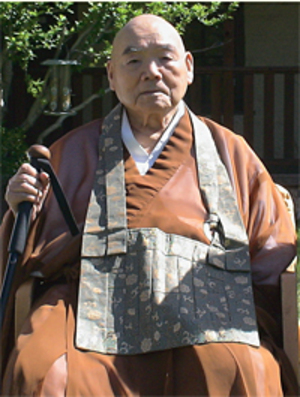I thought Brad Warner made a pretty good observation when he wrote on his blog:
Everybody loves a lynching. Even you. Trust me. You do. (Yes, I’m talking about you.) So when we find someone who falls into our own personal category of “lynchable” we are ready to go after him.

The comment arrived in the wake of the supermarket-tabloid advertisements that Warner seems to list with every post -- events, get-togethers, talks, etc. His brisk and sometimes boisterous style of writing makes the advertisements less sludgy than most and he has a nice and unpretentious way of offering Zen possibilities ... which, in this instance, touched on the sexual foibles of the 105-year-old Joshu Sasaki Roshi and his 'outing' on Sweeping Zen by Eshu Martin.
Everybody loves a lynching. Of course a literal lynching might be too much for the Buddhists who like to imagine their own tender-heartedness, but metaphorically speaking ... well, there is in fact this triumphant voice that growls, "hang 'em high!"
What's that about? I don't mean to say it's good or bad ... get out the tsk-tsk machine ... I just mean, what's that about?
My guess lands somewhere in the realm of the love-hate relationship anyone might have with the icons of their lives. And the greater the adoration, the greater the blood-lust when it arises.
Icons limit and what limits chafes. Most of the time, the chafing is put on the back burner because the love is so compelling. But when, for whatever reason, that love seems to have been betrayed, then all the previous chafing kept on the back burner comes rushing back like an avalanche gaining momentum and power ... roaring for redress and repentance and a return to earlier, more loving, times.
Everyone loves a lynching.
Everyone loves an icon.
What's that about?
.
What's that about? Might as well ask why do people like entertainment. Entertainment serves to distract one from their default condition of boredom, doubt, and discomfort. Instead, they can project all their unresolved stuff onto some external symbol, thereby avoiding confronting their own squirmy pathology.
ReplyDeleteI don't know if everyone loves a lynching but I agree that, once an idol or icon falls, supporters seem to fall into the loyal and disillusioned camps(and, in the case of Sasaki, you can definitely see that spectators are divided by the holy/assholy debate).
ReplyDeleteBUT- for most of them- no love has been betrayed. It is the affiliation with a higher power that has been insulted. If he was "my man" or "my team", his fall is my fall. This causes shame and the subsequent scramble to project the feeling of shame outward as soon as possible. Onto the fallen hero will do just fine; it's convenient and he's going down anyway. That's the "assholy" camp of lynchers. In the "holy" camp, the cause of shame is denied and/or projected onto the disaffected and disaffiliated.
When love is betrayed, it's different, simpler and deeper. It grabs you by the guts and you just want to scream bloody murder.
http://theconsciousprocess.wordpress.com/2012/09/26/the-game-of-rejection/
DeleteWhat's wrong with a good lynching?
ReplyDeleteIn Buddhist cosmology, every deity has both a good and evil persona.
Like when Tom Waits says in a song, "the Devil is just God when he's drunk"
There's nothing wrong with lynching. It's just a normal balance to putting your teacher on a pedestal.